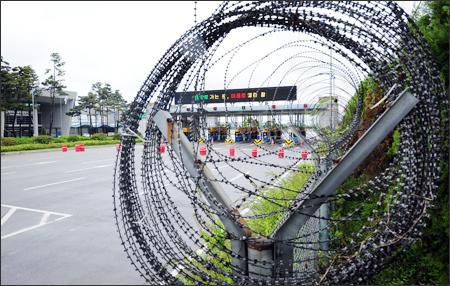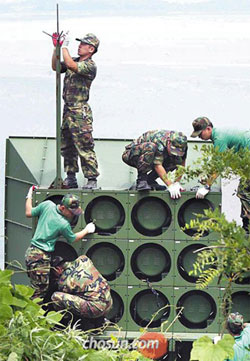ROK Defines NK as "Main Enemy," NK Severs All Inter-Korean Contact

Little activity is seen at the Dorasan Customs, Immigration and Quarantine Office near the inter-Korean border, a sign of the soaring tension gripping the peninsula after Seoul suspended all inter-Korean trade and exchanges except for a few aid programs, Monday. (Korea Times)
Kim So-hyun reports in Korea Herald that ROK officials plan to revive and define the DPRK as “the main enemy” as part of its military response to the sinking of the Cheonan.
Another presidential aide said on condition of anonymity that it was ”natural“ for Seoul to revive the main enemy concept, which was deleted from defense policy papers six years ago.
“The government has begun working-level discussions to go back to seeing North Korea as the main enemy,” he said.
“What now remains is the technical issue of how to phrase the concept and in which parts of the defense white paper.”
North Korea first started to be referred to as the “main enemy” in South Korean defense white papers in 1995 under former president Kim Young-sam, a year after a North Korean general threatened to turn Seoul into a “sea of fire.” But since 2004, the description was replaced by “direct military threat” or other watered-down expressions.
The government’s decision to reuse the “main enemy” concept comes as Seoul views the Cheonan’s sinking as the North’s “clear military provocation” and vowed to “maintain the principle of proactive deterrence” by immediately exercising its “right of self-defense” against future provocations by the North.
Lee has said earlier that “a lack of a clear adversary in terms of national security” may have led to “internal confusion within the military,” giving weight to voices within his office that they should return to seeing North Korea as the official adversary.
The DPRK’s Committee for the Peaceful Reunification of the Fatherland has announced that country will sever all inter-Korean connections, and evict South Korean personnel from the Kaesong Industrial Complex. The DPRK also announced that it will not engage in any inter-Korean dialogues or meetings for the remainder of the Lee Administration’s term of office.
Hwang Doo-hyong reports in Yonhap that the US and the ROK will also stage joint anti-submarine exercises:
South Korea and the United States will conduct joint anti-submarine exercises in the seas off the Korean Peninsula in the near future, the Pentagon said Monday.
“Those initiatives are a result of the findings of this recent incident,” spokesman Bryan Whitman told reporters. “We think that this is an area where, working with the Republic of Korea, we can hone some skills and increase capabilities.”

Soldiers disassemble loudspeakers at a lookout in Mt. Odu along the demilitarized zone after an agreement in inter-Korean military talks in June 2004 put an end to psychological warfare (Chosun Ilbo file photo)
Chosun Ilbo reports that ROK authorities are (literally) dusting off loudspeakers with the intention of broadcasting propaganda at its border with the DPRK. The DPRK has threatened to fire artillery shells at the loudspeakers.
South Korean soldiers of the Mt. Baekdu Unit in Gangwon Province, the northernmost observation post in the South, were busy on Monday dusting off loudspeakers used in psychological warfare operations that been stored in warehouses for the last six years. They brought them out following the Defense Ministry’s announcement on Monday that it will resume propaganda broadcasts across the border.
Soldiers initially checked to see if the 4 m by 3 m 500-watt speakers are operational. Those speakers had been at the forefront of psychological warfare operations against North Korea until they were dismantled in June 2004 following an inter-Korean agreement. Twenty-four speakers are tied together into one set to deliver news, weather information and music to North Korean soldiers and villagers across the border. The sounds can be heard 10-12 km away and as far as 24 km away in the stillness of night. Each set costs around W200 million (US$1=W1,214) to produce.
“These devices were the biggest nuisance for the North Korean military, because they are apparently effective in undermining the ideological morale of the troops,” a military officer said.
Some 94 loudspeakers along the border and 11 massive electronic display boards will be set up again. The display boards, measuring 110 m by 17 m, show propaganda slogans at night. It will take four to five months to get them running.
In addition to loudspeakers and electronic billboards, South Korea uses radio broadcasts and leaflets to carry out psychological warfare operations against North Korea. The Defense Ministry began FM radio broadcasts aimed at North Korea at 6 p.m. on Monday. The four-hour daily broadcast contain programs touting the superiority of democracy, the economic development of South Korea and comparisons between the North and South, as well as music. The broadcasts will be aired three times a day. Propaganda leaflets will be dropped over North Korean airspace as soon as weather conditions permit. Rainy weather prevented leaflets from being sent on Monday.
Na Jeong-ju writes on rumors about the DPRK’s internal activities in Korea Times:
In an article posted on its website, the North Korea Intellectuals Solidarity, a Seoul-based anti-Pyongyang organization, said the North’s military has strengthened combat readiness on direct orders from Kim after Seoul blamed the reclusive state last Thursday for a torpedo attack on the warship Cheonan in March.
“North Korea is holding massive rallies around the country to denounce South Korea and the United States,” the article said. “All participants, even civilians, must wear military uniforms.”
It said the North boosted surveillance at its borders with China and South Korea, noting that it acquired the information from its stringers operating there.
A South Korean military spokesman doubted the authenticity of the report, but said North Korea could resort to extreme military options.
Chosun Ilbo reports of rumors that NDC Vice Chairman and Director of the Operations Department, General O Kuk Yol, conveyed KJI’s orders “to be ready for combat”:
A South Korean security official said the government is “trying to verify” the report. According to the defectors’ group, O, who is in charge of operations against the South, called the Cheonan incident a “plot to strangle” the North. Kim commanded that the North should “achieve the reunification of the fatherland by all means” since it failed during the Korean War, O said.
Kim Sung-min, the head of defector station Free North Korea Radio said North Korean soldiers on furlough or official trips have been ordered to return to barracks.
A North Korean source said security guards in the North Korea-China border regions were ordered to punish South Koreans in China found slandering the North over the Cheonan incident.